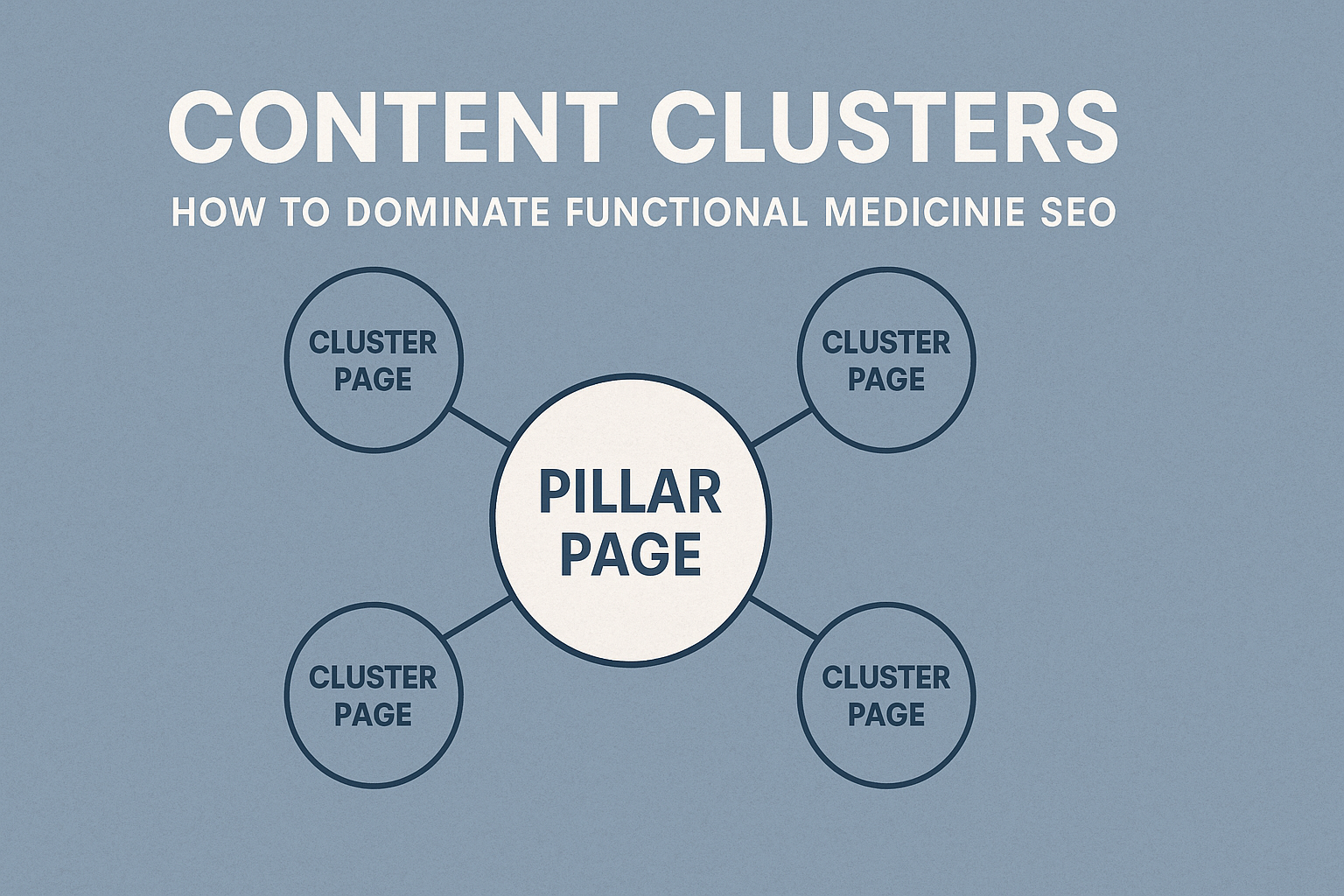
The online health space is more competitive than ever. Functional medicine practitioners not only need to educate patients but also stand out in Google search results against larger clinics, publishers, and general health sites.
The solution? Content clusters—a proven SEO strategy that builds topical authority, improves rankings, and turns patient education into a steady flow of qualified leads.
In this guide, we’ll cover:
What content clusters are and why they matter
How pillar and cluster pages work together
Why this strategy is perfect for functional medicine practices
Step-by-step instructions for building clusters
Sample cluster maps for common services
Pitfalls to avoid and how to future-proof your SEO
Content clusters (also called topic clusters) are groups of related content organized around a central “pillar page.”
The pillar page covers a broad topic in depth.
The cluster pages break that topic into smaller, focused subtopics.
Internal links connect everything together, signaling authority and improving SEO.
Pillar Page: “Functional Medicine Approach to Hormone Health”
Cluster Page 1: “How to Test Hormone Levels Naturally”
Cluster Page 2: “Cortisol, Stress & Adrenal Fatigue”
Cluster Page 3: “Balancing Estrogen, Progesterone & Testosterone Naturally”
Cluster Page 4: “Hormone Symptoms by Life Stage”
This creates a content ecosystem where patients (and Google) can easily navigate, showing that you’re the authority in your field.
Functional medicine is holistic by nature. One patient concern—say fatigue—touches multiple systems like hormones, gut health, nutrition, and sleep. This complexity is exactly what content clusters are designed for.
Benefits for your practice:
✅ Topical authority: Google recognizes your site as a trusted expert on root-cause health.
✅ Patient education: Patients find answers to their “why” and “how” questions.
✅ Conversion power: Well-structured content naturally leads visitors to book consultations.
✅ Scalability: You can expand clusters as new services, treatments, or questions emerge.
Start with 3–5 main areas that match your services. Examples:
Hormone & Endocrine Health
Gut & Microbiome Support
Weight Management & Metabolic Health
Thyroid & Autoimmunity
Longevity & Anti-Aging
Use tools like SEMrush or Ahrefs to find:
Long-tail patient questions (“How to balance hormones naturally”)
Symptom searches (“Why am I always tired?”)
Location modifiers (“Functional medicine doctor in [City]”)
Your pillar should:
Be comprehensive (2,500–4,000 words)
Include a table of contents
Link to each cluster page
Provide clear calls-to-action (consults, free guides, quizzes)
Each cluster page should:
Answer a specific patient question
Target niche keywords
Link back to the pillar
Include graphics, FAQs, and CTAs
Each cluster links to the pillar
The pillar links to all clusters
Related clusters link to each other when relevant
Share via:
Email newsletters
Social media posts
Patient handouts
Guest posts & partnerships
Use Google Search Console or Ahrefs to track:
Keyword rankings
Traffic & dwell time
Underperforming pages to refresh
Update regularly: Health data changes—keep content fresh.
Use schema markup: Add FAQ or HowTo blocks for rich results.
Localize clusters: Create versions with “[City]” for local SEO.
Optimize for AI & snippets: Use clear headers and concise definitions.
Avoid thin content: Each cluster page must add unique value.
Pillar Page: Functional Hormone Health: Root Causes & Solutions
Clusters:
How to Test Hormone Levels Naturally
Balancing Estrogen, Progesterone & Testosterone Naturally
Cortisol, Stress & Adrenal Fatigue
Thyroid & Hormone Interactions
Lifestyle & Nutrition for Hormone Balance
Hormone Replacement vs Functional Support
Hormone Symptoms by Life Stage (PMS, Menopause, Andropause)
| Week | Action |
|---|---|
| 1 | Pick your first pillar topic |
| 2 | Keyword & subtopic research |
| 3–4 | Write & publish the pillar page |
| 5–8 | Create first 3–5 cluster pages |
| 8–10 | Promote across channels |
| 10–12 | Monitor results & refine |
If you want your functional medicine practice to dominate SEO in 2025 and beyond, scattered blog posts won’t cut it. Content clusters give you a clear, scalable framework to:
Educate patients
Build authority
Win top rankings
Drive new consultations
Start with one pillar topic, build out your clusters, and watch your search visibility—and your practice—grow steadily.
👉 Ready to build SEO that works for functional medicine?
Pressed Solutions can help you map your clusters, write optimized content, and design SEO-ready websites that attract and convert patients.
Contact us today to get started.
